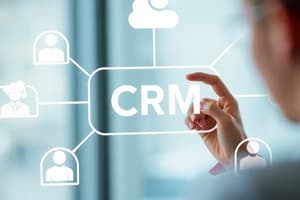Podcast
Questions and Answers
What is CRM?
What is CRM?
Customer Relationship Management
What is the purpose of a CRM system?
What is the purpose of a CRM system?
To help companies stay connected to customers, streamline processes, improve profitability, and build meaningful relationships.
What is a key feature of a CRM system related to customer information?
What is a key feature of a CRM system related to customer information?
Contact management
How does a CRM system help with lead tracking?
How does a CRM system help with lead tracking?
What task can a CRM system automate to save time and reduce errors?
What task can a CRM system automate to save time and reduce errors?
What benefit does reporting and analytics provide in a CRM system?
What benefit does reporting and analytics provide in a CRM system?
How does integration with other tools benefit a CRM system?
How does integration with other tools benefit a CRM system?
What is the significance of communication management in a CRM system?
What is the significance of communication management in a CRM system?
How does a CRM system improve customer experience?
How does a CRM system improve customer experience?
What benefit does a CRM system offer in terms of decision making?
What benefit does a CRM system offer in terms of decision making?
How does a CRM system contribute to higher conversion rates?
How does a CRM system contribute to higher conversion rates?
What role does a CRM system play in enhancing employee productivity?
What role does a CRM system play in enhancing employee productivity?
Flashcards are hidden until you start studying
Study Notes
Customer Relationship Management (CRM) Overview
Customer Relationship Management (CRM) is an essential tool for businesses of all sizes. It's a technology platform that provides organizations with the ability to manage their interactions with customers, prospects, and partners throughout the entire customer life cycle – from lead generation through sales, retention, and service. CRM systems help companies stay connected to their customers, streamline processes and improve profitability by building more meaningful relationships and driving loyalty and repeat business.
Key Features of a Good CRM System
A good CRM system has several key features that make it effective at managing relationships with customers and improving communication between departments within the company:
- Contact management: This feature allows you to store, organize, and access customer information such as contact details, purchase history, and behavior patterns.
- Lead management: A CRM helps you track leads, nurture them into customers, and monitor opportunities across different stages of the pipeline.
- Sales automation: Automating tasks like creating quotes, generating invoices, and tracking payments can save time and reduce manual errors.
- Reporting and analytics: Access to real-time metrics on sales performance, customer satisfaction, and other KPIs helps guide decision making.
- Integrations: Integration with other tools and platforms ensures data consistency and eliminates redundant data entry.
- Communication management: Manage email campaigns, phone calls, text messages, and social media interactions in one central location.
- Team collaboration: Facilitate teamwork and collaboration among members of your organization.
Benefits of Using a CRM System
There are numerous benefits to implementing a CRM system in your business:
- Improved customer experience: By keeping track of customer interactions and needs, companies can deliver personalized services and support.
- Increased efficiency: CRMs simplify and speed up many day-to-day operations, allowing employees to focus on more complex tasks and strategic thinking.
- Better decision making: With comprehensive data analysis, managers can make informed decisions based on hard facts rather than guesswork.
- Higher conversion rates: Tracking customer engagement helps identify areas where improvements can be made to optimize conversions.
- More targeted marketing: Insight into buyer preferences enables more effective targeting of marketing efforts.
- Enhanced employee productivity: CRMs provide a single source of truth for all customer interactions, reducing confusion and saving time searching for information.
- Increased revenue: Higher conversion rates and improved customer lifetime value contribute directly to increased revenue.
Choosing the Right CRM Software
With so many CRM options available, choosing the right one can feel overwhelming. Consider factors such as budget, business size, industry, specific requirements, integrations needed, and scalability when evaluating potential CRMs. Once implemented, training staff on how to use the software effectively will ensure maximum ROI.
In summary, CRM systems offer valuable tools to businesses looking to increase customer engagement, drive growth, and improve overall organizational effectiveness. Whether starting small or scaling large, there's likely a CRM solution tailored to fit any business need.
Studying That Suits You
Use AI to generate personalized quizzes and flashcards to suit your learning preferences.




